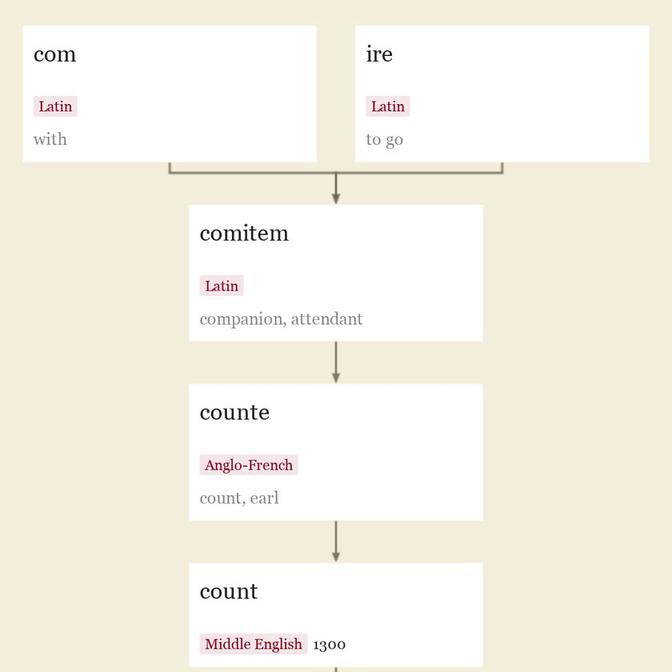comitatus (n.)
1875年,“同伴或随从的团体”,拉丁语集合体 comes, comitem “同伴,伙伴”(见 count(n.1))。在 posse comitatus 中,它的意思是“县级的”。
最早记录年份: 1875
comitatus 的相关词汇
count (n.1)

在一些大陆国家中,贵族的称号,对应于英国的 earl,大约在公元1300年左右,源自盎格鲁-法语的 counte "伯爵,伯爵"(古法语 conte),源自拉丁语的 comitem(主格 comes)"同伴,随从",罗马时期对省长的称呼,源自 com "和"(参见 com-)+ ire "去"的词干(源自 PIE 词根 *ei- "去")。这个术语在盎格鲁-法语中用来翻译古英语的 eorl,但这个词从未真正被本土化,主要是用来指外国的称号。
In ancient Rome and the Roman empire, [a comes was] a companion of or attendant upon a great person; hence, the title of an adjutant to a proconsul or the like, afterward specifically of the immediate personal counselors of the emperor, and finally of many high officers, the most important of whom were the prototypes of the medieval counts. [Century Dictionary]
在古罗马和罗马帝国中,[ comes ]是伟大人物的同伴或随从; 因此,是副总督等的副官的称号,后来特指皇帝的直接个人顾问,并最终成为许多高级官员的称号,其中最重要的是中世纪伯爵的原型。[世纪词典]
posse (n.)
1640年代(早在14世纪的盎格鲁拉丁语中),缩写自 posse comitatus “县的力量”(1620年代,晚于13世纪的盎格鲁拉丁语),源自中世纪拉丁语 posse “人员组成; 力量”,来自拉丁语 posse “有力量,有能力”(参见 potent)和 comitatus “县的”,晚期拉丁语“法院宫殿”的属格(参见 comitatus)。一般意义上的“武装力量”始于1640年代; 现代俚语意义上的“小团伙”可能源自西部电影。
Posse comitatus, the power of the county; in law, the body of men which the sheriff is empowered to call into service to aid and support him in the execution of the law, as in case of rescue, riot, forcible entry and occupation, etc. It includes all male persons above the age of fifteen. In Great Britain peers and clergymen are excluded by statute. The word comitatus is often omitted, and posse alone is used in the same sense. [Century Dictionary]
Posse comitatus,县的力量; 在法律上,警长有权召集一群人来协助和支持他执行法律,例如在救援、暴动、强行进入和占领等情况下。它包括所有15岁以上的男性。在英国,贵族和牧师被法令排除在外。单词 comitatus 经常被省略, posse 单独使用具有相同的意义。[世纪词典]